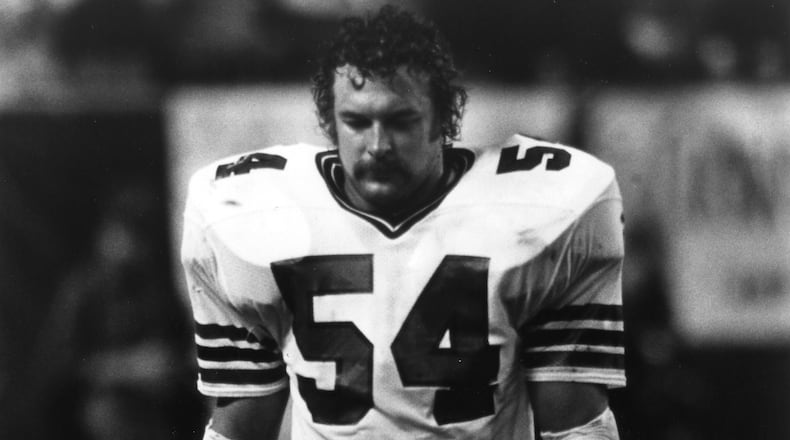In life, Fulton Kuykendall was the embodiment of the fearless, football-seeking linebacker. His penchant for throwing all of himself and then some into each tackle earned him one of the most colorful nicknames in Falcons lore.
“You don’t get the name ‘Kaptain Krazy’ for no good reason,” chuckled former Falcons quarterback Steve Bartkowski, the team’s first-round pick in 1975, the same year Kuykendall was taken in the sixth round by the Falcons out of UCLA.
In death, Kuykendall will serve as a lesson on the heavy tax one pays to play his game in a way that was equal measures joyous and violent.
After a long battle with dementia, Kuykendall died early Thursday morning at a memory-care facility in Canton. He was 70.
According to his wife of 44 years, Kuykendall’s brain will be donated to Boston University as part of its ongoing study into traumatic brain injury among NFL players. The rest of his body will go to the Philadelphia College of Osteopathic Medicine for use in medical school studies.
“Fulton will become a teacher for a year,” Sherry Kuykendall said. For much of his post-football life, her husband was a part of the medical community, working in the cardiac catheterization lab at Piedmont Hospital.
Over a 10-year career with the Falcons (1975-84), Kuykendall played in 124 games, with 93 starts. He was a member of the famed 1977 Grits Blitz defense that allowed an NFL record-low 129 points, starting five games that year before breaking his arm while tackling O.J. Simpson.
At a lanky 6-foot-4, 225 pounds, Kuykendall wasn’t necessarily built along the sturdy dimensions of a defensive mauler. But that was the role he enthusiastically assumed, fairly earning the Kaptain Krazy name he wore as a Falcon.
“He played with great intensity, and was part of one of the best defenses Atlanta has ever seen,” Bartkowski said. “All that intensity took a toll on the guy. He was a hitting machine, no doubt about it.”
Jerry Glanville, who was the Falcons’ defensive coordinator for that Grits Blitz collection before he later became head coach, Thursday remembered one long-ago game in San Francisco and the thunder Kuykendall was capable of calling down on a ball carrier.
“I was calling the defenses from the press box. (The 49ers) ran a fullback lead, and it was one of the loudest noises I’ve heard in a stadium when Kuykendall hit him. That’s who he was,” Glanville said. “He could uncoil and strike.”
Kuykendall’s story was veined with contradictions.
This linebacker who played with such loud ferocity was quiet and unassuming away from the field.
“What I’ll remember most is his sweet smile and his curly brown hair. All the caregivers he ever had adored him because he was so sweet,” Sherry Kuykendall said. “He had a beautiful, calm temperament.”
“He didn’t talk a lot, but didn’t need him to talk a lot to have fun with him,” said another teammate, former center Paul Ryczek.
“Soft spoken, but hit very hard. Very hard. Too hard, considering the toll on his brain and body,” Ryczek said.
Football clearly did a number on Kuykendall. His wife counted 28 surgeries her husband underwent, including a knee replacement and three shoulder replacements. Then the clouds of traumatic brain injury gathered over him at the end. Kuykendall was part of the first successful players’ lawsuit against the NFL, charging that the league misinformed its players about the dangers of brain injury and failed to adequately protect them.
In 2017, Kuykendall said, “I hope I don’t get any money just because I don’t want to have that disease.”
But he couldn’t dodge the repercussions of multiple concussions. As for the settlement money, his wife said, “It wasn’t that much, but it was better than nothing.”
But another contradiction: Kuykendall couldn’t stay angry at football.
“He loved the sport,” Sherry said. “I remember when we first met, I think his first salary was for $19,000, and he was like, ‘I can’t believe they’re going to pay me $19,000 to do what I love.’”
And, even after all the pain and the gradual loss of himself that came with football, he was able to maintain that love?
“He really did,” his wife said. “You could ask him even after he retired if he’d do it all over again, and he’d tell you, yes.”
Kuykendall is survived by his wife, son Trent Kuykendall, and three siblings. No date for a memorial has been set.
About the Author
Keep Reading
The Latest
Featured


